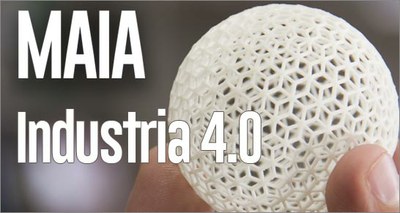Industry 4.0: At the start laboratory of hi-tech components for airplanes, engines and medical prostheses
21/6/2018
 MAIA lab on advanced materials for producing future 3D printing inks and manufacturing hi-tech components for aircrafts, engine parts and, in perspective, medical prostheses, is born at the ENEA Casaccia Research Center near Rome. Funded with 4 million euro by the Lazio Region, the research and service structure will be available to large industries, SMEs and other applied research bodies.
MAIA lab on advanced materials for producing future 3D printing inks and manufacturing hi-tech components for aircrafts, engine parts and, in perspective, medical prostheses, is born at the ENEA Casaccia Research Center near Rome. Funded with 4 million euro by the Lazio Region, the research and service structure will be available to large industries, SMEs and other applied research bodies.
Producing future 'inks' for 3D printing with which manufacturing hi-tech components for aircrafts, engine parts for automobiles and in perspective medical prostheses. These are the main sectors of the ENEA laboratory MAIA on advanced materials, funded with approximately 4 million euro by the Lazio Region.
The Laboratory "Advanced Materials in an Open Infrastructure" - MAIA - to be set at the ENEA Casaccia Research Center, will study new extremely fine powder materials (from 10 to 50 micron) available to hi-tech companies and ENEA for manufacturing components, semi-finished and finished products, thanks to innovative equipment and process and qualification systems of the structure, such as printers, presses and ovens.
"We will create a laboratory of research and services for large industries, SMEs and other applied research bodies, being able to rely on cutting-edge equipment enabling us to develop innovative materials for 3D printing and the related application techniques, and create prototypes of hi-tech components for aerospace companies in Lazio and throughout Italy, given that ours will be an open infrastructure ", Dario della Sala, Head of the ENEA Division" Technologies and Processes of Materials for Sustainability" said. "At the beginning the target market will be the aerospace sector, since our Region has the largest Italian technological district in the sector, where advanced materials are considered a priority and 3D printing holds promising industrial applications.
But we also want to anticipate the demand that may arise from sectors such as the energy and especially the biomedical one, where 3D printing is rapidly spreading for the development of health prostheses, as well as in cultural heritage, for integrative restorations and 'replicas' of works of art for information purposes ", Della Sala pointed out.
Additive manufacturing, i.e 3D printing, is a state-of-the-art sector of "Industry 4.0", as it allows a complete customization of the final product, produced rapidly without the need for molds, with competitive performance and costs and in a very wide range of light materials (plastic, metal alloys, ceramics, composites). By its very nature this manufacturing technique allows "file storage" rather than products storage, a very useful aspect for the on demand manufacturing of spare parts, such as aircraft turbine blades.
For more information please contact:
Dario della Sala, ENEA – Head Division "Technologies and Processes of Materials for Sustainability" dario.dellasala@enea.it
